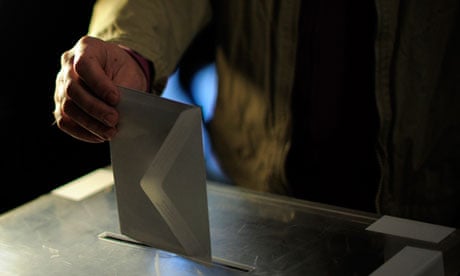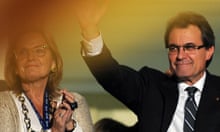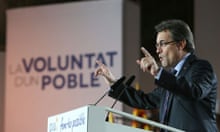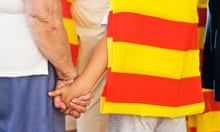Catalans have begun voting in elections that could lead to the north-eastern region breaking away from Spain, after the region's leader Artur Mas made the running in the campaign by vowing to hold a referendum on independence for rich but indebted Catalonia.
Unlike the Scottish referendum set for 2014 in agreement with London, the central government in Spain has pledged to block an independence vote for Catalonia by appealing to the constitutional court, which stopped the Basque country from holding a similar plebiscite in 2008.
Voting closes at 8pm local time (19:00 GMT), and exit polls are expected shortly afterwards. A Sigma Dos opinion poll for the Guardian on Thursday predicted that Mas's Convergència i Unió (CiU) party would fall 9-11 seats short of an overall majority in the Catalan parliament, meaning he would have to reach deals with smaller parties to hold the referendum he has promised within a four-year mandate.
"Catalonia is one of the oldest nations in Europe and the world. We have overcome all our difficulties: we have fought the military and dictatorships, and we're still alive," Mas said on Friday, the last day of campaigning allowed by law.
Apart from opposition in Madrid, and heading for fewer seats than he won in the last elections two years ago, one of Mas's biggest difficulties is uncertainty over whether a newly independent Catalonia could remain within the European Union and the euro currency.
The European commission president, José Manuel Barroso, said in Spain last weekend that EU treaties required breakaway states to join the queue for membership.
Catalonia has its own distinct language and culture, and many Catalans think they would be better off without Spain, because some estimates show they pay more in tax than they get back from Madrid. In September, 1.5 million people flocked to an independence rally in Catalonia, which prompted Mas to call for early elections and a referendum.
In 1934, the Spanish army put down an independence revolt led by the then Catalan leader Lluís Companys, which added to simmering tension before the 1936-39 civil war. Francisco Franco's ensuing dictatorship suppressed all regional aspirations for decades, but after his death Spain adopted a democratic constitution in 1978 giving considerable autonomy to all 17 of the country's regions, including Catalonia.
A recent survey by the Catalan-government-funded research group CEO estimated that 57% of Catalans would vote to split from Spain, although Sigma Dos showed that many Catalans would be reluctant to part with the Spanish language, passports or Lionel Messi and his Barça teammates playing football in its Primera Liga.
Spanish business leaders – many of them Catalans – have said independence would have dire consequences for Catalonia, which would lose its main market, and for Spain, which relies on the region for almost one-fifth of its economic output.
José Manuel Lara, head of the Barcelona-based publishing group Planeta, threatened to move what is the world's sixth-largest publisher away from Catalonia if the region should secede from Spain.
"There is no publishing business that has its headquarters in a foreign country, or one which speaks another language," Lara said in September.
For the central government in Madrid, moves towards Catalan independence could unsettle financial markets as Spain struggles to convince its European partners that it can borrow money at affordable rates and thus avoid a bailout in order to balance the books in a country hit by its worst economic crisis in decades.
"There was no point holding elections when the priority should have been fighting the crisis," the Spanish prime minister, Mariano Rajoy, said after the EU summit in Brussels on Friday.
Struggling to remain the second-largest party in the Catalan parliament, the Socialists have voiced frustration that high unemployment and unpopular spending cuts have not been prominent in campaigning, although across Spain they have sparked massive street protests and, on 14 November, the country's second general strike this year.




